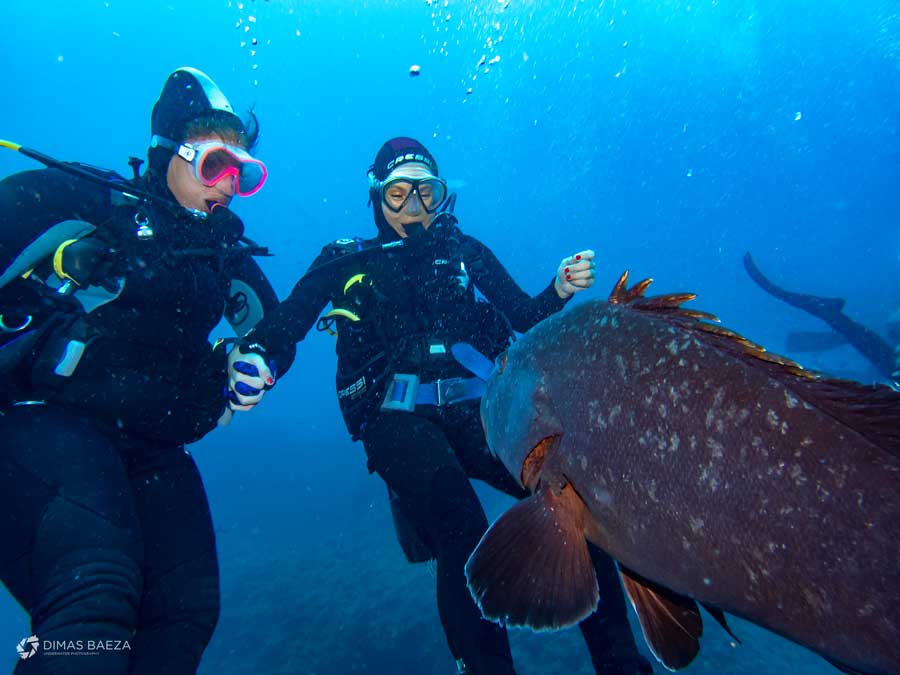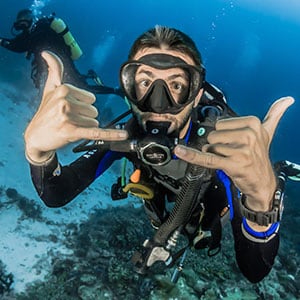Have you always been curious to learn scuba diving but haven’t dared yet?
Most people do not decide to dive for three reasons:
- Fear, distrust or respect.
- They see it as inaccessible. How to start diving?
- They believe that diving in Spain will not be worthwhile.
FEAR, DISTRUST OR RESPECT
The first reason is the most common, everyone has some insecurity at the thought of descending many meters and breathing underwater.
Recreational diving is one of the safest sports because of its strong emphasis on safety. It is easier for something to happen to you while running than while diving.
In our dive center we make sure that your experience is gradual, always starting with a detailed explanation, then an entry into the sea in an area where you stand or in a pool for you to gain confidence. Once you have passed those minutes of nervousness is when you really experience the incredible feeling of weightlessness and you can gradually descend deeper accompanied by a dive instructor, always making sure that you can rise to the surface safely.
Astronauts practice scuba diving before going into space because it’s the closest thing there is to being in zero gravity.
There are other people who do not want to dive, because they say they have tried freediving (apnea) and it has hurt their ears a lot. As in any activity, if you do not have the proper knowledge, you will not do it correctly and safely.
Under water there is pressure, called hydrostatic pressure, and in the ear canals we have air. If you go down to depth quickly and without compensating, the change in pressure will cause your ears to hurt. There are several ways to compensate the ears, but the most effective is the Valsalva maneuver.
It consists of pinching your nose with your fingers and blowing through your nose, in this way the internal pressure of the ear will be compensated with the external pressure and it will not hurt. When we dive, we always descend very slowly and it is very easy to perform this maneuver. However, in freediving you descend much faster, therefore, it will always be more complicated.
When we are not sure if we should carry out the activity or with which company to do it, there are very useful tools on the Internet: TRIPADVISOR or GOOGLE BUSINESS. Here you can see the reviews of the dive centers, both positive and negative, from people who have already tried it. This is very useful for diving as well as for choosing a good restaurant or hotel. Whenever I go on a trip and I don’t know the place well I use it and if it has a lot of positive comments it almost never disappoints.
When we talk about respect it is always going to be something positive. In recreational diving there are hardly any accidents and the few that do happen are due to negligence. That is why it is very important to follow the recommendations of your instructors and always go with professionals.
THEY SEE IT AS INACCESSIBLE How to start diving?
Years ago I myself did not even think about diving in Spain. Whenever I imagined myself diving it was in some Caribbean beach. But it turns out that in Spain diving is quite accessible since we are one of the European countries with more dive centers. For the simple reason that we are surrounded by water.
It should also be noted that regulation and quality controls in Spain are more exhaustive than in other non-European countries. Therefore, training and safety tends to be better, although there are exceptions.

There are two ways to get started in diving:
A diving baptism consists of a first contact with diving, where the instructor will give you an explanation of how the equipment works, safety procedures, what you are going to do and what you can see.
You will experience the sensation of breathing underwater and you will see the wonderful underwater world and feel like a fish, besides taking an unforgettable souvenir.
PADI Open Water Diving Course.
If what you want is to learn to dive and be able to get a certification that will allow you to dive anywhere in the world, this is your best option. This course consists of a theoretical part and a practical part. Once finished you will be able to dive up to 18 meters deep and it does not expire, it is forever.
I studied marine biology and have always been fascinated by the sea. When I took this course I could not stop training and keep learning until I became a professional. Currently I am the owner of Dive Academy Santa Pola and I have managed to turn my hobby into my profession.
IN SPAIN IT IS WORTH DIVING.
Spain is the second European country with the second largest protected marine area. This means that year after year we are enjoying an increase in marine life. This is due to the fact that fishing is limited and can only be carried out with specific gear and without exceeding the stipulated quotas.
We are lucky enough to be right in front of Tabarca Island, which is the first marine reserve in the world.e Spain, formed in 1986. We can enjoy thousands of fish of many species at very few meters deep. The water is usually very clear and in summer we can even dive with a shorty or even without a wetsuit because the water rises to 28 or 29 degrees.
It is considered one of the best dive sites in Spain and the Mediterranean.
We also have very old sunken ships and some with a lot of history, caves and caverns, etc. So give it a try and don’t think about it, it will be a very good decision.


